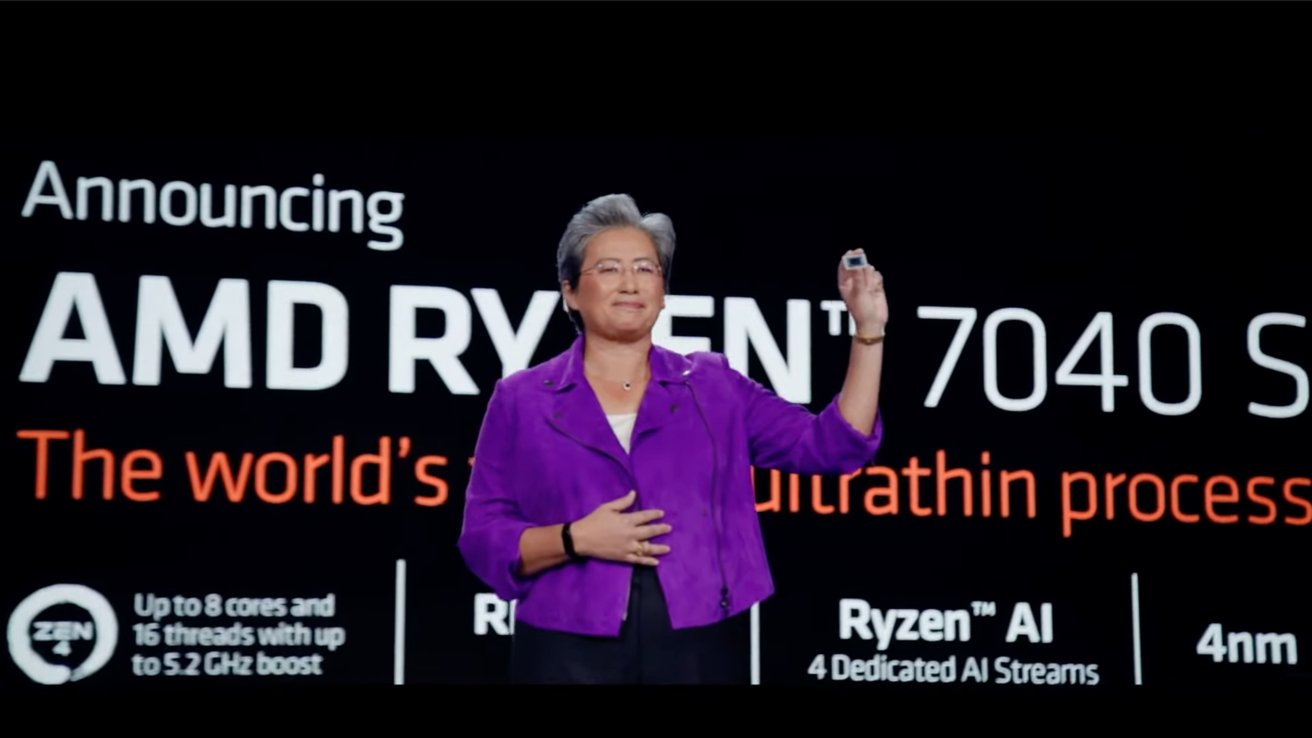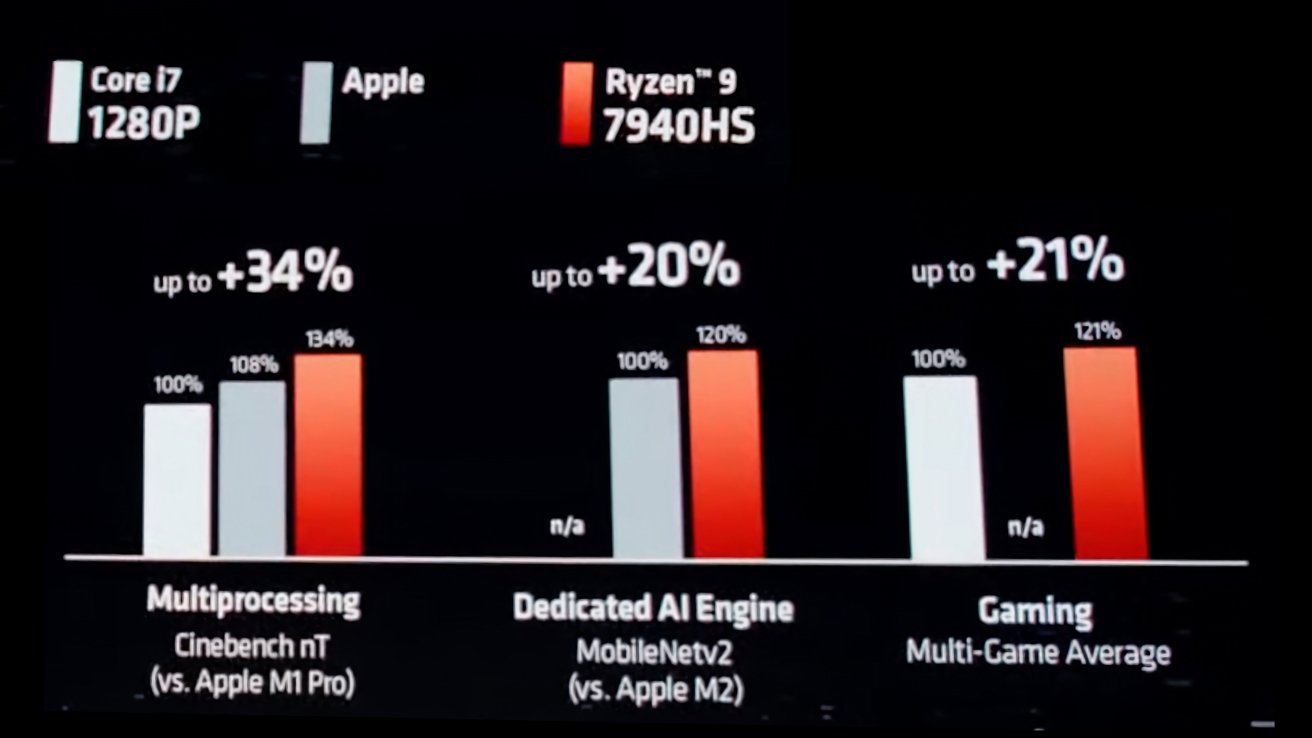AMD trying to take on Apple Silicon with Ryzen 7040
AMD has shown off its Ryzen 7040 series processor that is able to edge out the year-old Apple Silicon M1 Pro processor in cherry-picked benchmarks.

AMD Ryzen 7040 revealed during CES 2023
The AMD Ryzen 7040 is built on the 4nm process with 25 billion transistors. The Zen4 technology offers up to 8 cores and 16 threads with up to 5.2 GHz boost and a 12-core GPU.
Comparatively, Apple's M1 Pro that debuted in November 2021 has 33.7 billion transistors on the 5nm process. It is a 10-core processor with two high-efficiency cores and eight high-performance cores. It uses a 16-core GPU.
In a "live" demonstration of Blender running a render, AMD shows the Ryzen 9 7940HS with a clear lead on Apple's M1 Pro. The demo shows Apple with the advantage over Intel, but AMD's processor finished several seconds before Apple.
The AMD processor has a clear advantage in being the newer processor and using the superior 4nm platform. However, the extent of its capabilities will be unknown until it is tested following release in everyday workflows.
It's also not clear how power-efficient the chip will be. There's also questions surrounding the overall technology stack which is maintaining legacy X86 architecture, thermal overhead, and more once it is placed in an actual laptop.

On-stage benchmarks show AMD in the lead
Apple is also guilty of overplaying its hand in a keynote presentation with selective benchmarks, though it rarely calls out the competition directly. AMD is not the first competitor to claim it has bested Apple's powerful silicon.
AMD claims up to 30 hours of video playback thanks to the efficiency gains and a powerful on-chip AI.
AMD notably doesn't mention the M1 Max or M1 Ultra, as it seemingly doesn't have direct competitors for those chipsets. The other high-end processors announced at the event run on the 5nm process, and AMD didn't compare those chips to the higher-end Apple Silicon.
The AMD Ryzen 7040 series will launch in March 2023 across a wide array of computers. Pricing and availability are not yet known.
Apple's M2 processor debuted in the summer of 2022. The M1 Pro and Max hit shelves in November 2021.
The M1 and variants are still based on the 5nm process, so it is expected that the upcoming M2 Pro and M2 Max will continue to use the same one. However, Apple's vertical integration of hardware and software give it an advantage, even when compared to newer technologies.
The A16 processor was rumored to use the 4nm process before Apple had to backtrack and use the 5nm process again. It is claimed that thermal efficiency was one of the reasons for this backtracking. The iPhone 15 and the A17 processor are rumored to skip 4nm to 3nm, which may pave the way for Apple's future M3 processor.
How well the AMD Ryzen 7040 series actually competes with Apple's M1 Pro, M2, and possibly the M2 Pro will be determined after the March launch. The M2 Pro is expected in the first half of 2023.
And, AMD presented the announcement on a 14-inch MacBook Pro, presumably with M1 Pro processor.
Read on AppleInsider

AMD Ryzen 7040 revealed during CES 2023
The AMD Ryzen 7040 is built on the 4nm process with 25 billion transistors. The Zen4 technology offers up to 8 cores and 16 threads with up to 5.2 GHz boost and a 12-core GPU.
Comparatively, Apple's M1 Pro that debuted in November 2021 has 33.7 billion transistors on the 5nm process. It is a 10-core processor with two high-efficiency cores and eight high-performance cores. It uses a 16-core GPU.
In a "live" demonstration of Blender running a render, AMD shows the Ryzen 9 7940HS with a clear lead on Apple's M1 Pro. The demo shows Apple with the advantage over Intel, but AMD's processor finished several seconds before Apple.
The AMD processor has a clear advantage in being the newer processor and using the superior 4nm platform. However, the extent of its capabilities will be unknown until it is tested following release in everyday workflows.
It's also not clear how power-efficient the chip will be. There's also questions surrounding the overall technology stack which is maintaining legacy X86 architecture, thermal overhead, and more once it is placed in an actual laptop.

On-stage benchmarks show AMD in the lead
Apple is also guilty of overplaying its hand in a keynote presentation with selective benchmarks, though it rarely calls out the competition directly. AMD is not the first competitor to claim it has bested Apple's powerful silicon.
AMD claims up to 30 hours of video playback thanks to the efficiency gains and a powerful on-chip AI.
AMD notably doesn't mention the M1 Max or M1 Ultra, as it seemingly doesn't have direct competitors for those chipsets. The other high-end processors announced at the event run on the 5nm process, and AMD didn't compare those chips to the higher-end Apple Silicon.
The AMD Ryzen 7040 series will launch in March 2023 across a wide array of computers. Pricing and availability are not yet known.
Apple's M2 processor debuted in the summer of 2022. The M1 Pro and Max hit shelves in November 2021.
The M1 and variants are still based on the 5nm process, so it is expected that the upcoming M2 Pro and M2 Max will continue to use the same one. However, Apple's vertical integration of hardware and software give it an advantage, even when compared to newer technologies.
The A16 processor was rumored to use the 4nm process before Apple had to backtrack and use the 5nm process again. It is claimed that thermal efficiency was one of the reasons for this backtracking. The iPhone 15 and the A17 processor are rumored to skip 4nm to 3nm, which may pave the way for Apple's future M3 processor.
How well the AMD Ryzen 7040 series actually competes with Apple's M1 Pro, M2, and possibly the M2 Pro will be determined after the March launch. The M2 Pro is expected in the first half of 2023.
And, AMD presented the announcement on a 14-inch MacBook Pro, presumably with M1 Pro processor.
AppleInsider will be covering the 2023 Consumer Electronics Show in person on January 2 through January 8 where we're expecting Wi-Fi 6e devices, HomeKit, Apple accessories, 8K monitors and more. Keep up with our coverage by downloading the AppleInsider app, and follow us on YouTube, Twitter @appleinsider and Facebook for live, late-breaking coverage. You can also check out our official Instagram account for exclusive photos throughout the event.Bruh AMD is running their CES keynote on 14'' MacBook Pro's after roasting the M1 Pro pic.twitter.com/E9JWUBJLZp
— Ian Zelbo (@ianzelbo)
Read on AppleInsider

Comments
A 4nm M2 Pro class SOC should already be out in shipping Macs right now, today. Apple has the superior financial resources, the stronger position to get a favorable spot in the fab line with TSMC, the better ISA, the better core design, the better software stack.
Blame COVID, blame China, but AMD faces all that, too.
Stop slacking Apple!
Right on, competition is good.
1. Lots of loyal customers
2. They own and develop there own OS, which they tightly inter grate to their hardware. They can tweak the os to the hardware, the hardware to the os.
3. They have their own retail stores, where customers can get their apple products service.
etc.
I believe Max is still faster than 90% of the x86 CPUs and beating all the 8-core chips in its heydays, but Alder Lake is still more powerful (on paper).
https://www.youtube.com/watch?v=OMxU4BDIm4M&t=1503s
AMD and Intel are playing catchup to match Apple's 2021 chip in 2023.
Their chips boost clock speeds to 5.2GHz so short-run benchmarks get an advantage and they are using a more advanced chip process.
Intel and AMD are the PC industry heavyweights and every presentation they've done since Apple's chips has shown how far behind they are because they only ever competed with each other.
Their marketing material is also based around theoretical/reference designs. AMD doesn't make the OS or the shipped product so the efficiency, quietness, stability of the retail system depends on Microsoft, PC assembler and AMD components all working well together. They never have in the past, there's no reason to expect it to be different in 2023.
When Apple releases M2 or M3 Pro/Max chips this year, they will jump ahead 1-2 years again. Intel openly admitted they only plan to catchup to Apple in 2024 and surpass them in 2025:
https://appleinsider.com/articles/21/10/28/intel-to-outpace-moores-law-surpass-rivals-in-2025-ceo-says
Talk is cheap though, Apple actually shipped a better product, marketing talk is meaningless until Intel and AMD ship better products.
Huh? Not that advanced? What evidence is such a claim based on? What would make them more advanced?
Huh?
Maybe the incentive would come if Apple would get into web services and build servers. Maybe that might egg them on to cooperate, also note Qualcomm is on the horizon with those three ex-Apple engineers are working on a new SOC chip too, that chip might also be designed for servers along with being a chip that would be used in smart phones and tablets. The next three years it’s going to be very interesting indeed.
The only thing they Intel and AMD can do right now is pump up the frequency and use more wattage (energy), I believe Apple is running at 3.2 3.4 ghz at this time which is a lot lower than the 5.2 ghz barn burners which is what Intel and AMD are demonstrating in most of their presentations.
Because Apple designs both the OS and the hardware under one roof Apple can afford to design a more elegant solution while Intel and AMD are stuck using brute force, they have no choice they can’t directly change the OS to fit the hardware nor can they add any other new co-processing chips (not without Microsoft approval) into the mix hence they are disrupted.